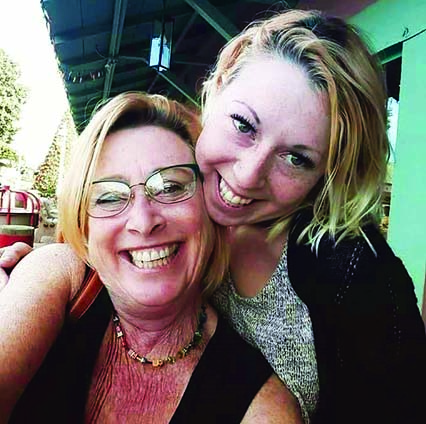By Kristen L. Polin, MAEd, Community Bridges, Inc. (CBI) When Kelly Denman was just 9 years old, she faced the loss of her father under no ordinary circumstance. After struggling...
By Kristen L. Polin, MAEd, Community Bridges, Inc. (CBI)
When Kelly Denman was just 9 years old, she faced the loss of her father under no ordinary circumstance. After struggling with alcoholism for many years and losing everything, Kelly’s dad was found dead at a bus stop in Phoenix with a bottle in his hand at the age of 37. He was homeless and disconnected from all those who cared about him.
This is a childhood experience forever imprinted to Kelly’s memory and today she finds herself wondering if things could have been different with the right help and the right resources to save her dad. Fast forward to a woman who is now 32 years old and on a personal mission to help change the direction for others who are on a similar path. She is motivated by her past and making sure another 9 year old child never loses a parent the way she did.
Kelly also has her own story, defined not only by her experience with losing a parent but also defined by her own battle with addiction as a young adult. Today, Kelly celebrates more than 5 years in her own recovery and now has the opportunity to help others and give back.
 Kelly is a Navigator. She is part of a special team within CBI, also fondly referred to as “blacktop warriors”, defined by a career that takes them to the streets to find and assist the chronically homeless population, find bridge or permanent housing, and build a network of support designed to overcome every barrier that tries to get in the way. Kelly is part of a team that does whatever it takes.
Kelly is a Navigator. She is part of a special team within CBI, also fondly referred to as “blacktop warriors”, defined by a career that takes them to the streets to find and assist the chronically homeless population, find bridge or permanent housing, and build a network of support designed to overcome every barrier that tries to get in the way. Kelly is part of a team that does whatever it takes.
Whatever it takes
The Navigators are a special crew. They are a diverse group of individuals who share their own experience, strength and hope with others while exercising a skillset to build a full network of support around someone who has to rebuild everything. They rely on teamwork and community collaboration to get the job done. Every Navigator is in recovery and they know this level of intervention is often the last shot at bringing someone back a life with some dignity.
Kelly believes in second and third chances and so does one of her clients, Francisco. At the age of 35, Francisco is fortunate to have a place he can call home in Chandler, AZ with Kelly’s daily assistance to find stability and a fresh start. Following years of abuse in the home and a lifetime struggle with a serious mental illness, Francisco ended up on the streets and lived in fear trying to survive. He had no hope and figured this is where his life would end up. But a Navigator intervention helped him a second time around through a second chance. After reconnecting with Kelly, he was able to make small steps towards finding a place to live and addressing his behavioral health needs that require daily attention. Kelly and Francisco are also a team in assuring he makes it to appointments, practices everyday life skills and learns to become self-sufficient. This takes patience and perseverance…something they have both had to learn through their own life experiences.
Everyone has a Story
People heal through connection and sharing that life experience is how Navigators help those who are often the hardest to reach. We see the homeless but they often feel invisible. We know what they look like but we don’t know their story. We all have one and the Navigators themselves never hold back sharing what they do and why they do it.
Through this connection, we learn that these individuals we connect with are wartime and peacetime veterans and have history defending our country. Some are parents, someone’s child and once a contributing member of society. What led them to the streets may not always be the same but we know all too often its roots are connected to addiction, mental health issues, medical problems or financial ruin.
It Takes Collaboration
Thanks to collaborative efforts throughout the Valley, some of our most vulnerable and chronically homeless individuals are now safe in housing and have a real place to call home. Individuals who are making this transition do it with the daily support of a Navigator who relies on behavioral health agencies, other nonprofits, food banks, the faith community, the local business community and city leaders who can open doors and make things happen. Housing is the first priority and then a full continuum of wraparound supportive services hold the keys to success.
For too long, the idea of managing homelessness seemed to be the solution. Today, ending homelessness is possible when a community can come together and work as a team to tackle the problem since a home is only one step in the long process towards recovery.
The Keys to Success
The keys that unlock a future home that is permanent is only the first step. CBI’s Navigators play a key role in helping clients to establish stability and often that is in assisting with basic life skills we often take for granted. Francisco not only receives assistance from Kelly to get to all of his appointments, she assists him with coordinating meals, how to clean his apartment and do laundry, and manage the day to day appointments for his behavioral health care.
Permanent supportive housing is successful when two things are aligned; housing, daily needs are met and a support system is in place prove a full wraparound layer of supports. CBI’s Navigators assist participants with locating housing, securing furnishings, furniture, appliances, food, and clothing and moving in to their new housing. The Navigator also assists with obtaining other benefits such as AHCCCS, etc., and services such as behavioral health, legal, medical, education, employment, identification and transportation. The Navigator visits 3-4 times/week to monitor progress and helps participants keep medical and other appointments, follows up with appeals processes or other advocacy needs for participants’ care. As clients become stabilized in their housing, the Navigator visits less frequently.
A Collaboration Defined by Success- Project H3 VETS
No Veteran should be homeless. This was the collective message led by Senator John McCain this past Veterans Day when a community rallied together to become the first in the Nation to end homelessness among our veterans. Project H3 VETS is a nationally recognized effort led by the Arizona Coalition to End Homelessness (ACEH) that involves the City of Phoenix, Arizona Department of Veterans’ Services, Valley of the Sun United Way, Cloudbreak Communities, the Phoenix VA Health Care System, HOM Inc., Arizona Department of Housing, Community Bridges, and the Human Services Campus.
With the support of CBI’s Project H3 VET Navigators, Phoenix became the first city in the nation to end chronic homelessness and every vet was successfully housed in bridge or permanent housing before the holidays. Through the work of all of the partners, there are no longer any chronically homeless veterans living on the streets when the project started with 200 who were homeless.
Success requires teamwork and collaboration. This has been an exciting project and proof that we can end homelessness.
Hundreds of lives have been changed by this hardworking team. So many people are grateful for their determination and big hearts.
Thank You Navigators!
Navigators- In their Own Words
“We will go to great lengths for our clients and do whatever it takes!”
— Roberta Rodriguez
“We do whatever we can to help others and guide them through life hurdles”. — Deanna Danner
“When all of the doors for our clients are closed…we go through the back window to get things done.” — Kelly Denman
“Every step our clients take towards their own independence, no matter how big or small is a success in my eyes.” – Bryan Reilly
The most rewarding part of my job is having the opportunity to help others and hopefully make a difference in someone’s life. –Alvin Holtz
 Kristen Polin is the Vice President of Community Relations and Development for CBI. She has been with the company for 17 years and enjoys writing for Together AZ to promote awareness about successful projects that are changing lives in the community. Kristen can be reached at [email protected].
Kristen Polin is the Vice President of Community Relations and Development for CBI. She has been with the company for 17 years and enjoys writing for Together AZ to promote awareness about successful projects that are changing lives in the community. Kristen can be reached at [email protected].
About CBI — Community Bridges, Inc., one of the largest agencies of its kind in Arizona, is a private, nonprofit organization serving Maricopa, Pinal, Gila, and Yuma counties by providing a continuum of care that begins with prevention and continues for individuals and families through treatment and recovery. CBI’s mission is to maintain the dignity of human life and be an agent of positive change in our communities. CBI’s clinical treatment, family preservation, prevention, and education services help to reduce the impact of alcoholism and drug addiction as a predominant factor in homelessness, domestic violence, child abuse, child neglect, assault, homicide, and suicide.
www.communitybridgesaz.org































